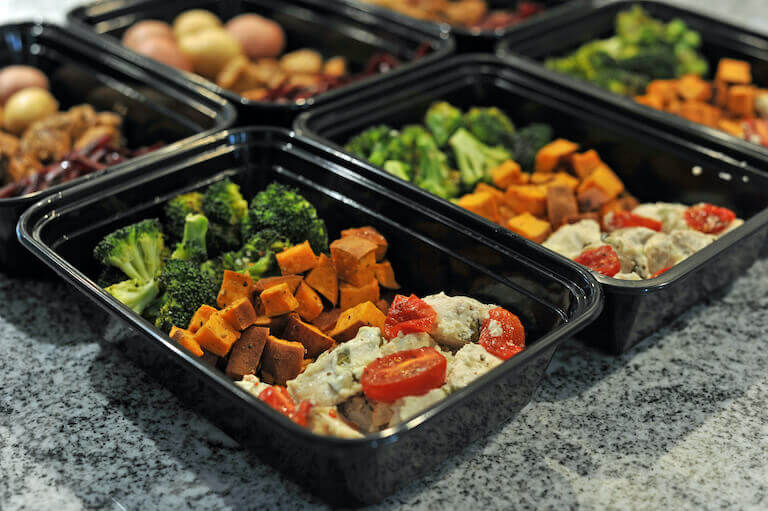What if you could offer the best parts of cooking at home with some of the best parts of dining out? You might give people the savings and convenience of staying in and plating their own courses with the delight of eating professionally prepared food.
Meal prep services can do just that—and you can build a business around it, offering your clients these and other benefits. In return, you might scratch an entrepreneurial itch and also explore your creativity in the kitchen outside of a traditional restaurant setting.
How might you get in on the action? Read on.
Better Taste, Less Waste: How the Meal Prep Business Model Thrives
Home gourmets might think of meal prep as the day they set aside to prepare ingredients or meals in advance of the upcoming week. The prep itself could take a day or two between shopping, preparing ingredients, cooking, and packing meals. Proponents often cite budgetary savings—buying grocery items in bulk, eating out less, reducing food waste, fewer impulse purchases—along with the health benefits that come with portion control and making meal decisions ahead of time (versus when hungry or tired).
The opportunity for an aspiring business owner might come in serving folks who love the idea but are tired of doing it themselves, are too busy, don’t enjoy cooking, or simply don’t want to do it. Other prospective clients might have health reasons like specific dietary restrictions and need professional guidance.
A meal prep business either delivers ready-made meals to customers’ homes (like a personal chef but on a larger scale), or it might just deliver the ingredients that customers assemble and cook themselves; the latter is often referred to as a meal kit service.
Although demand for meal prep surged during the pandemic, the global prepared meals market had already been growing. It is projected to grow from $156.33 billion in 2022 to $248.13 billion by 2029.
Like a Dating App For Food: Meal Prep Helps Clients Find Their Match
Although meal prep businesses and prepackaged meals each offer customers a variety of menu options, a meal prep business typically offers more choice and personalization.
For example, customers might order mix-and-match ingredients to assemble meals themselves. Or they might search for entire pre-assembled or pre-cooked meals; this appeals to folks with dietary restrictions and preferences, as well as foodies and others.
A meal prep business could allow you to dive deeper into a more specific niche than you might with a packaged food business, in which you create the same item or items for your customers again and again. There, consistency in product and packaging is vital. And while each of those is also crucial with meal prep, you might also find an opportunity to tweak components and work hand-in-hand with clients to design plans that cater to their needs.
In this way, operating a meal prep business combines elements of a recipe developer, personal chef, and caterer, along with bits of the knowledge regarding packaging, storage, and delivery you’ll need if you develop prepackaged food as part of your menu.
5 Steps to Start a Meal Prep Business
A culinary education can help you develop the expertise to create mouth-watering meals that people will want to order again and again. And business training might help ease the learning curve so you can go from brainstorm to profit faster.
Here are five steps to get started:
1. Decide Who and What You Want to Serve
Consider the reasons people are attracted to meal prep services and evaluate your own strengths. Where do these merge? That might be your niche.
Do you want to deliver breakfasts and lunches or dinners? What about vegetarian or vegan options, gluten-free offerings, Keto, or gourmet? The more specific you get, the better; you’ll have more focus and you can market to your target audience more directly.
Think about your delivery options also—how will you deliver the meals, and what’s your radius? Will you also offer pick-up options or travel to farmers markets to sell from a booth?

A meal prep business can include delivering heat-and-eat meals or the ingredients for customers to make meals themselves.
2. Figure Out How You’ll Turn Your Idea Into a Business
After the initial brainstorming, it’s time to get into the details and create a solid business plan. You’ll probably pivot as you go and as you learn, but it’s helpful to start somewhere. Some of the essential information includes: target clients, market analysis, goals, funding sources, equipment, any staffing needs, profit and loss statement, and a marketing plan.
You’ll also need to identify your supply chain—figuring out where you’ll find your ingredients, from wholesalers to local farms and businesses, as well as your packaging materials and any cooking and prepping equipment you might need. This is a crucial component in your business plan, as the decisions you make here will affect a lot of your expenses as well as your overall efficiency.
Chef Instructors at Auguste Escoffier School of Culinary Arts offer a wealth of knowledge students can tap into as they explore culinary careers, and many instructors also have experience as entrepreneurs. Students may also connect with mentors in their field via the school’s collaboration with the Global Leadership Enhancement & Mentorship Network (GLEAM), a nonprofit, volunteer network of restaurant and foodservice professionals offering a number of exciting mentorship programs to other industry professionals.
3. Boring But Necessary: Licenses, Permits, and Insurance
Ah, the dreaded paperwork and red tape portion of the journey. This is a necessary part of any business, but one that, if done properly, will allow you to focus on your dreams instead of on forms.
Whether you’re prepping from home or renting a space, you’ll need the proper business licenses and insurance. These vary by state and even by town and city, so check your local laws and regulations. The U.S. Small Business Administration is a good place to start, and you may need to register with the U.S. Food and Drug Administration as well.
You may benefit from setting up a legal business entity like an LLC, or you might opt for an S Corp or other setups. These help you legally define the structure and purpose of your business, both for practical reasons and tax reasons. Do your due diligence to research the different business entities and which one best applies to your situation. It might help to consult a CPA and an attorney as you explore this.**
4. Get the Word Out! Develop Your Marketing
Now it’s time to get to the nitty gritty and develop your menu along with your marketing. What sets you apart from other meal prep services, and how will you reach your target customers?
When choosing your niche and writing a business plan, you likely fleshed out elements of your branding. This includes things like the colors you’ll primarily use in everything from your logo to your packaging; the kind of feel, or vibe, you want your business to be known for; and the specifics of the cuisine itself. Now’s the time to let your branding shine—show it off on your website if you have one, on social media, and other places you advertise.
You might take a few tips from menu design when brainstorming how to present your offerings. Concepts like categories, appearance, descriptions, and customer psychology may all be factors.

Meal delivery services have grown in popularity in recent years.
5. Find Your Space, Hire Help if Needed
If needed, consider renting space to make and prep your meals, and hire help as well.
When starting out, you might be fine as a one-person crew, but there’s a good chance you’ll need others if you grow. This might be delivery drivers, packaging help, or prep in the kitchen, even dedicated customer support when the business is big enough. Your business plan should have spelled this out.
Want to Know More?
You can experiment with recipes and business ideas at home, and even try them out on friends and family. But when you’re ready to formalize those plans, Escoffer’s Food Entrepreneurship program might be for you.
There, you can explore applied marketing concepts, business planning methods, and core culinary principles that could prepare you to launch a business.
If you’re ready to find out how to take your meal prep idea from concept to reality, contact us to discover more about our programs.
HERE ARE SOME OTHER ARTICLES YOU MIGHT LIKE:
- The Ultimate Guide to Starting a Home-Based Catering Business
- 4 Keys to Running a Cottage Industry Bakery
- How to Start a Successful Health Coaching Business
*Information may not reflect every student’s experience. Results and outcomes may be based on several factors, such as geographical region or previous experience.
**Auguste Escoffier School of Culinary Arts does not provide legal advice. Always consult with an attorney before creating a new business entity!

